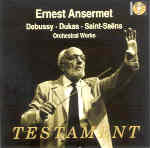This reissue of Ernest Ansermet treasures from the early 1950s is split more or less evenly between Debussy and Dukas, with Saint-Saëns’ popular Danse macabre thrown in for a bang-up encore. It’s all in mono except for Dukas’ fairy-tale ballet La péri. But Decca was making excellent recordings at the time, and while stereo is important in works that benefit from its advantages in projecting spatial relationships, only sticklers for the latest technology will be deterred from exploring this.
That stereo La péri still sounds remarkably fresh for a 1954 recording, a lovely score lovingly played by the Paris orchestra. The other Dukas work is The Sorcerer’s Apprentice, forever saddled with the mental image of a Sisyphusian Mickey Mouse and his water buckets from Disney’s Fantasia. Better to think of it as an orchestral scherzo–and a terrific one at that. Ansermet is very good at delineating the languorous opening, and he leads a vigorous climax that misses something of the diabolical nature of the work, an aspect in which Markevitch excelled. Similarly, his Danse macabre, for all its precision and excitement, lacks some of the tension imparted by Paray.
The meat of the disc consists of Debussy’s Jeux, a title usually preceded by the word “elusive”. This ballet about a tennis match sometimes can sound formless, even indistinct, but in Ansermet’s hands it’s a masterpiece of subtlety and harmonic adventure. Versions by Boulez and Haitink boast superior orchestras (Cleveland and the Concertgebouw), but the Swiss band acquits itself well. Jeux definitely benefits from replacing the atmospherics of generic “impressionism” with Ansermet’s diamond-hard approach to the score, which doesn’t lack for color or its erotic subtext. Ansermet’s second version, made just a few years later, is preferred due to stereo’s added clarity, but this one will do nicely.
The other Debussy here is really Debussy/Ansermet, it being the conductor’s 1932 orchestration of Debussy’s Six épigraphes antiques, the composer’s piano duet version derived from his uncompleted music intended as background to poems by Pierre Louys. As might be expected, Ansermet’s rendering is totally idiomatic, with sinuous “Oriental” flute lines and diaphanous orchestration rescued from vagueness by his typically sparkling account. The Dukas works are with the Paris Conservatory Orchestra, the rest with the Swiss orchestra Ansermet founded in 1918.
































